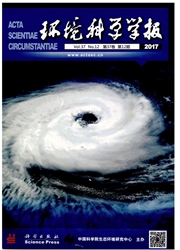

 中文摘要:
中文摘要:
污染物排放是导致环境质量恶化的根本原因,但污染物排放与环境质量的变化在空间上却存在不完全协同、匹配的现象(即空间分离).为分析中国省域尺度环境质量与污染物排放的空间分离现象,构建了空间分离指数和重心模型,并以SO2排放量和空气中SO2浓度为例进行实证分析.结果表明:2000—2010年,全国SO2排放量由1965.8×104t增加至2182.9×104t,空气中SO2浓度由0.046mg·m^-3下降至0.035mg·m^-3;SO2排放量最多的10个省份占全国排放量的比重为57.4%,地区间排放强度差异较大;SO2污染的空间格局未发生明显变化,华北、西北、西南及山东、湖南是我国SO2污染相对严重区域;中国SO2排放与污染间存在一定程度的空间分离,空间分离指数为27.3~36.0,SO2排放重心和污染重心的距离在19.3~144.0km之间;10年来,SO2排放重心向西北方向移动,污染重心却向东南方向移动,这也是环境质量与污染排放空间分离现象的一个表现;SO2排放与污染间的空间分离现象在逐年减弱,10年来,空间分离指数年均降低2.7%,排放重心和污染重心的距离年均减小9.9km.研究结果对正确理解污染减排与环境质量改善的关系,确立区域污染减排和环境质量目标具有一定的借鉴意义.
 英文摘要:
英文摘要:
Pollutant emission is the root cause of the deterioration of environmental quality. In some regions environmental quality was mismatched with pollutant emission. The spatial mismatch index (SMI) and Barycenter model were established to investigate the mismatches by province, and emission and ambient concentration of SO2 were used to make empirical analysis. The results showed that ① SO2 emission increased from 1965.8×104 t in 2000 to 2182.9×104 t in 2010, and the average annual ambient concentration of SO2 decreased from 0.046 mg·m^-3 to 0.035 mg·m^-3; ② the sum of SO2 emission from ten most significant provinces accounted for 57.4% of the total SO2 emission of the whole country, and obvious regional differences of emission intensity were found; ③ During the period from 2000 to 2010, no obvious changes were found in the spatial distribution of SO2 pollution. Northern, Northwestern, Southwestern China and Shandong and Hunan provinces were consistently significant SO2 pollution areas; ④ The spatial mismatches were founded between SO2 emission and concentration of SO2 in ambient air. The SMI was 27.3~36.0, and the distance between pollution barycenter and emission barycenter was 19.3~144.0 km; ⑤ As another manifestation of spatial mismatch, the moving direction of pollution barycenter differed from that of emission barycenter. In the past 10 years, the pollution barycenter had moved towards the northwest, while the emission barycenter had moved towards the southeast; and ⑥ The spatial mismatch between SO2 emission and SO2 pollution were decreasing gradually. Compared to 2000, the SMI decreased by 2.7% per year and barycenter decreased by 9.9 km per year. This study is helpful in correctly understanding the connection between pollutant emission reduction and environmental quality improvement, and in establishing regional goals on pollutant emission and environmental quality.
 同期刊论文项目
同期刊论文项目
 同项目期刊论文
同项目期刊论文
 期刊信息
期刊信息
